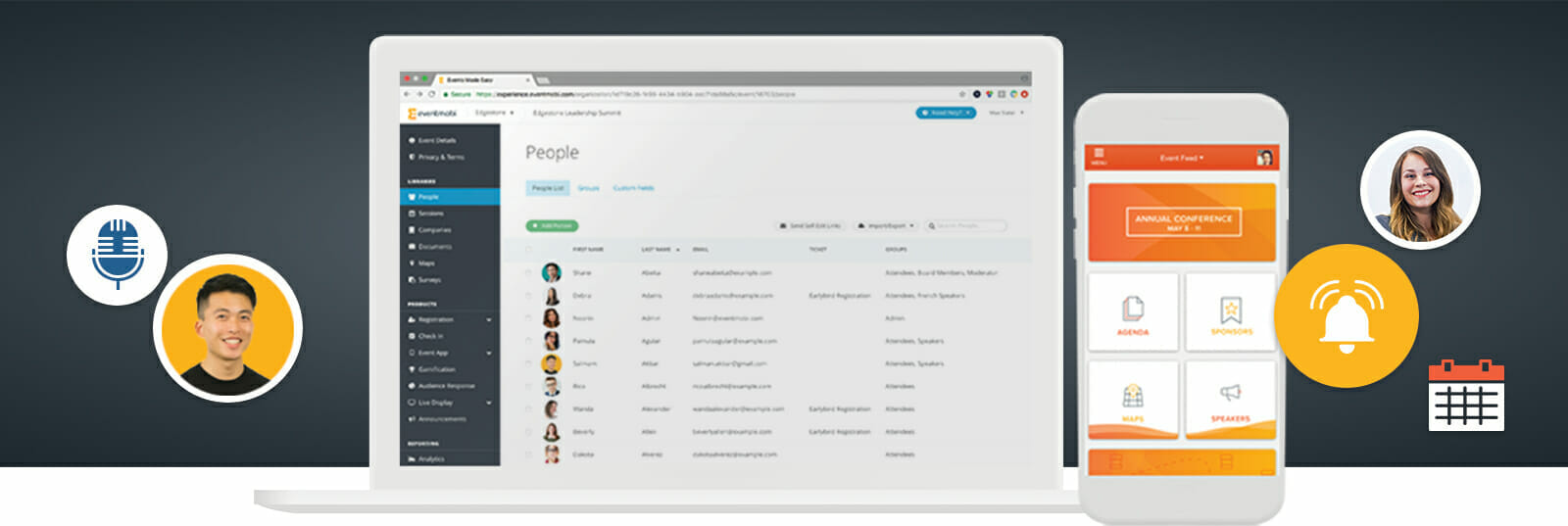Event Management Platforms: Technology and The Experience of Planning Events
Learn about the top event management platform that planners are using to save time and effort when executing their meetings and events.
I remember the state of the meeting and events industry when we first started EventMobi about 10 years ago. Event apps were the new technology on the block for event planners. Back then, it was tough to convince planners that engaging attendees via their mobile devices could be an integral part of the event experience.
There were lots of concerns. How many attendees would actually use an event app? What kind of impact could an event app have in creating a better event experience? How are attendees supposed to enjoy the event if they’re looking at their smartphones the entire time?
Fast forward 10 years later and today, it’s nearly impossible to get attendees to not access their phones during live events. The proliferation of smartphones and other digital devices means engaging event attendees via social media, event apps, live polls, push notifications, and other apps available is no longer a nice-to-have for event planners. It’s a must-have.
Nowadays, the use of event technology is pretty much regarded as an industry standard and expected by event attendees. The big challenge that no one is talking about is the experience of planning events and managing the complexity of these ever-growing event management software tools, not to mention the enormous amounts of valuable event data that gets consumed and generated.
In 2009, having a website that could register attendees was really all you needed from your event management software. Now, with the popularity of event apps and their vast array of functionality, the new problem event marketers and planners have to worry about is synchronizing attendee data and event information across multiple event software tools, each built by a different vendor.
This explosion of technology for events has now become integrated throughout every critical point within the event lifecycle, from event promotion and managing registrant information, to engaging attendees onsite and collecting feedback, as well as reporting on event analytics. According to research by Cramer and Event Marketer, the number of event technology vendors grew from 144 in 2014 to 245 in 2018 — a growth of over 70% in just four years!
Now, you may think that as the CEO of an event software company, I’d be pushing for event planners to use MORE technology. On the contrary, this event software sprawl is actually causing major problems for event planners in terms of how they’re spending time and resources—whether they know it or not.
In this post, I hope I can highlight why we need to radically change our view of event management software. Your experience as an event planner in managing the technology behind your events is as critical as the experience you are creating for your attendees.
I am also very excited to finally announce the launch of our new open event management platform, the Experience Manager, which empowers event planners to work smarter by bringing all their event technology tools into one place. In the same way that EventMobi’s Event App revolutionized the attendee experience and onsite engagement almost 10 years ago, we hope the Experience Manager revolutionizes how event marketers and planners plan and manage events.
The Event Technology Breaking Point – When Your Tools Are Not Talking To Each Other
Let’s take an objective look at the current situation when having to build an event technology stack. You probably approach the situation by trying to procure different functionalities from different vendors depending on your needs. This could include your website platform, email marketing, registration and check-in, event app, attendee tracking, live polling, and software for your surveys and event analytics.
Generally, we tend to either purchase a “best of breed” solution that is complicated and expensive, or, if the needs are simple, we go with a very basic solution that is sometimes free or low in price. Either way, planners have to deal with the following problems:
- It takes a ton of time to research and select individual event software tools. All the research, content reading, and demos it takes to find a tool that solves a specific problem is extremely time-consuming. Not to mention, you might have different staff in different departments doing the exact same thing!
- Less negotiating power. When buying separate tools, you can’t negotiate on price or feature bundling to save more. And if you are signing up for a basic event app, remember that you get what you pay for. Nothing is free without a reason!
- Learning how to use all of these different event software tools is incredibly distracting and time-consuming. Many “best of breed” solutions aren’t designed to be easily used by event planners. For example, some marketing automation tools are quite complex and the setup process requires having a background in marketing operations. With that said, even basic tools take time to learn, set up, and configure.
- Difficult event management integrations. Once you have chosen all of your event software vendors for your event tools, if you want to make your workflow easier, you have to set up automated integrations to sync the data between each tool. This can be messy work that often requires help from separate vendors and technical people who work in other departments. Some vendors also charge a lot for integrations as a way to encourage you to use their entire suite of products.
- No unified event data center. Even after investing time in event management integrations, your event data will still be housed across multiple platforms — which makes gathering event insights and reporting a lot more tricky and time-consuming. You have to stitch together all the event data yourself to get a full view of the attendee journey. Since the event data isn’t aggregated into one easily accessible location, it is extremely difficult to gather insights and compare them year over year or event to event. To top it off, your data analysis becomes an even more cumbersome experience if you end up switching vendors the next year!
Now, this isn’t to say point solutions don’t have their place in an event planner’s workflow. Depending on your events and organizational needs, they likely do! But the experience of working with so many different products, and trying to connect them all to each other, is not ideal for planners when time and resources are constantly at risk of being cut. Very few point solutions are designed to integrate well with other technologies for event planners looking to build an event management ecosystem.
The Myth of the Integrated “All-In-One” Event Management Platform
You may be thinking, “Ok, if point solutions are so resource-intensive, then “all-in-one” software is the ultimate answer here, right?”
There are very few comprehensive and scalable all-in-one solutions currently on the market like EventMobi’s Experience Manager platform. And most of the others have been built based on technology and assumptions that are no longer valid.
- The high cost of entry. The price of behemoth solutions that “do it all” can be quite high and inaccessible to an event planner’s budget. This makes it hard for smaller events or companies with non-consolidated budget across departments to justify the expense. Large price tags also mean larger buying teams, which increases the risk of not being able to purchase at all or within the necessary time frame. Another factor to keep in mind is that these types of solutions usually don’t allow for an a la carte feature selection — which means you’ll have to pay for tools/functionality you won’t ever use.
- Patchworked backends and complicated systems. Many “all-in-one” event software solutions on the market today are actually groupings of separate technologies that have been acquired by a larger company and strung together with quick APIs/integration. This means you still end up needing training on every tool because they each function separately. Plus, they’re generally old and complicated systems. There’s also inconsistency in product quality. Some products in the “all-in-one” solution will be complex, while other products will be basic and lack customization because each tool was built for different audiences.
- Your data is taken hostage. Some solutions will have APIs that let you integrate with data and tools your business already uses. However, it’s common that even within their own conglomerated product, integrations can be choppy and limited. They also tend to penalize you for using an external vendor for any of your tools. Essentially, they charge you for access to your own data that lives in their system!
Open Event Management Platforms are the Future
The event management platform of the future is one that offers reliable and affordable options to planners of all event types and sizes. The ideal platform should be able to offer:
-
-
- Management of all event tools in one seamless backend. This includes registration, email invites, check-in, session tracking, lead retrieval, live streaming, event apps, networking, push notifications, gamification, live display, polls, surveys, and analytics. Even if planners want to use products outside of their platform vendors’ suite, the option should be made available.
- Integration with other systems their organization already uses, or plans on using, to simplify how they transfer data between systems — without getting charged high fees.
- Data unification in reporting and analytics so that planners can quickly gather insights about how attendees are interacting with each other, speakers, and sponsors before, during, and after their events.
- Customizable event software with a la carte feature selection, flexible design, and branding options, all of which should scale based on the size of the event.
- Security, reliability, and scalability. When a lot is at stake, it’s critical that the underlying platform is built on reliable and scalable technology.
- Collaboration across teams. Running events is a team sport. There are multiple people (often across different departments) that use different parts of the platform at different stages of the event. It’s critical that the event management platform allows for administration and collaboration across team members.
- Flexibility for enterprises. Enterprise events don’t necessarily mean complex and large. Sometimes they are small but numerous. This means enterprise event management platforms need to be able to scale and adapt to a variety of event types and sizes, from small internal staff meetings to large-scale external user conferences. It’s the ability to aggregate results and information across events and over time that makes a platform enterprise-ready.
-
The Experience Manager: EventMobi’s Event Management Platform – Built for The Future, Available Today!
About a year ago, we at EventMobi made the decision to quietly start building something truly innovative. An event management platform that would be the necessary blend event planners require between smaller point solutions and patchwork, “all-in-one” software.
Today, EventMobi publicly releases the second iteration of this product (after much beta testing). We call it the Experience Manager platform. It’s an open event management platform, built on modern, scalable, reliable, and secure technology. We have one goal: to give event planners a single, easy-to-manage platform that enables them to design an incredible event experience for attendees at every stage of the event lifecycle, no matter the event size or type.
Within the Experience Manager platform, you can choose from any of our core 12 product sets and hundreds of features. The platform is also able to integrate with additional vendors you may want for extra functionalities. And, because it’s all managed in one platform, it’s easy to learn and use. Plus, all of your event data is aggregated in one platform, which makes reporting much faster and insightful.
EventMobi’s long-term vision is to allow organizations to seamlessly plan, market, manage, execute, and evaluate their events from the Experience Manager platform. We’re excited to share the Experience Manager with the wider world and look forward to building more tools, partnerships, and integrations in the future that improve the planner’s experience with their event technology.
If you want to see how it can help you streamline your workflows today, learn more here.
How to Know if you Need an Event Management Platform
Here’s how you know if you’re ready to move to a new event management platform, like EventMobi’s Experience Manager:
- You’re using over 5 pieces of separate event technology to engage attendees before, during and after the event.
- You’re relying on more than one other team or department in your organization to help manage your event technology. E.g. IT, Marketing, etc.
- You can’t negotiate costs for most of the technology platforms you’re using for your events because you’re sharing licenses with other teams in your organization.
- Your event software tools are not integrated.
- You have to present multiple analytics from different tools or create your own event reporting from separate data sources to show ROI and measure success against your event goals.
- You and/or your technical team struggle to learn and configure all of the event tools you’re using to engage attendees.


